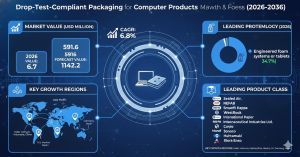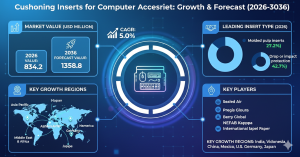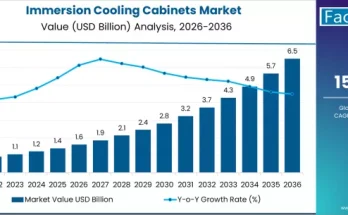In today’s hyper-connected world, the explosion of data is reshaping how businesses operate. Big data technology and services have become integral to enabling organizations to process, analyze, and derive actionable insights from vast volumes of data. This market is witnessing remarkable growth as businesses across sectors strive to harness data for strategic decision-making, improved operational efficiency, and enhanced customer experiences.
Market Overview:
Big data refers to massive and complex datasets that cannot be efficiently handled by traditional data management systems. Big data technology encompasses the software, tools, and platforms that enable data storage, sharing, visualization, and analysis. These technologies allow organizations to uncover hidden patterns, identify trends, and predict outcomes that are vital for business growth.
Big data services, on the other hand, include consultancy, integration, support, and managed services that help enterprises implement these technologies seamlessly into their operations. Together, technology and services form the backbone of modern business intelligence solutions.
The adoption of big data solutions is widespread across industries, including healthcare, retail, finance, manufacturing, and telecommunications. Companies are leveraging data analytics to enhance product development, optimize operations, predict market trends, and improve customer engagement.
Key Trends & Drivers:
- Integration with Advanced Technologies:The fusion of big data with artificial intelligence, machine learning, and cognitive computing is transforming how data is analyzed. Organizations are using these integrations to improve predictive analytics, automate decision-making, and generate real-time insights.
- Rise of Big Data Analytics:Businesses are increasingly relying on analytics tools to extract actionable insights from diverse and complex datasets. Big data analytics helps organizations enhance operational efficiency, personalize customer experiences, and identify new revenue opportunities.
- Operational Efficiency & Innovation:Big data technologies support process automation, predictive maintenance, and risk management, allowing organizations to streamline operations while innovating products and services based on data-driven insights.
- Focus on Customer Experience:Organizations are using big data to understand consumer behavior, preferences, and trends. Insights gained from data allow companies to tailor offerings, optimize marketing strategies, and build stronger customer relationships.
Applications Across Industries:
- Healthcare:Big data analytics is revolutionizing patient care by integrating electronic health records, genomics, and clinical data to enable predictive diagnosis, personalized treatment, and better resource management.
- Finance:Financial institutions utilize big data to detect fraud, assess credit risk, and enhance investment strategies through real-time analytics and predictive modeling.
- Retail & E-commerce:Retailers employ big data to optimize inventory, enhance pricing strategies, and deliver personalized recommendations based on consumer behavior patterns.
- Manufacturing:Predictive maintenance, quality control, and supply chain optimization are key areas where big data is applied in manufacturing industries.
- Government & Public Sector:Big data assists governments in smart city initiatives, public safety, transportation optimization, and policy planning through improved data management and analysis.
Regional Insights:
- North America:The region is a prominent player in big data technology and services due to early adoption of advanced technologies, robust IT infrastructure, and strong government support for data-driven initiatives. Organizations leverage big data for competitive advantage, digital transformation, and strategic planning.
- Europe:European countries are investing in big data solutions, particularly in sectors like healthcare and finance. Regulatory frameworks emphasizing data protection and privacy are encouraging businesses to adopt compliant and secure data analytics practices.
- Asia-Pacific:Rapid digitalization, increasing adoption of IoT devices, and growth of e-commerce are driving demand for big data technologies in Asia-Pacific. Organizations in this region are increasingly focusing on improving operational efficiency and customer engagement through data-driven insights.
Challenges & Restraints:
Despite the promising growth, several challenges affect the adoption of big data technologies:
- Data Security & Privacy Concerns:The accumulation of massive volumes of sensitive and unstructured data raises concerns about data breaches and unauthorized access. Organizations need to implement robust security protocols to safeguard information.
- Complexity of Implementation:Deploying big data solutions involves integrating multiple systems, tools, and processes. Organizations often face challenges related to technical expertise, infrastructure, and cost.
- Scalability & Real-time Analysis:Managing and analyzing ever-growing datasets in real time remains a challenge for many organizations. Ensuring efficient storage, processing, and visualization capabilities requires continuous investment in infrastructure and technology upgrades.
Technological Advancements:
Big data technologies continue to evolve rapidly. Modern analytical tools allow organizations to perform complex data processing, predictive modeling, and visualization. Emerging technologies such as edge computing, cloud-based analytics, and AI-driven data management are enhancing the speed, accuracy, and accessibility of insights.
Businesses are increasingly adopting platforms that combine big data with AI and ML to extract actionable intelligence. This integration enables enterprises to automate decision-making, enhance customer experience, and optimize business operations in ways that were not possible before.
Market Segmentation:
The big data technology and services market can be categorized into servers, storage, networking, software, and services.
- Big Data Software:This segment dominates the market as it enables enterprises to collect, store, and analyze large datasets efficiently. Analytical software provides businesses with insights to enhance decision-making and forecast trends.
- Services:Consulting, integration, and managed services are critical for the successful deployment of big data technologies. These services help businesses implement solutions, manage data lifecycle, and maximize return on investment.
- Hardware (Servers & Storage):Robust infrastructure is essential for storing and processing massive datasets. The hardware segment supports the execution of complex analytics and high-performance computing tasks.
Future Outlook:
The future of the big data technology and services market is closely linked to the ongoing digital transformation across industries. Organizations will continue to invest in data-driven strategies, analytics platforms, and AI-powered solutions to stay competitive.
We can expect further advancements in predictive analytics, real-time data processing, and cognitive computing, which will expand the scope of big data applications. Moreover, increasing awareness of data privacy, regulatory compliance, and ethical use of data will shape the development and adoption of big data solutions.
Conclusion:
The big data technology and services market is a cornerstone of the modern digital economy. By enabling organizations to transform raw data into meaningful insights, it drives operational efficiency, innovation, and customer satisfaction. As businesses increasingly embrace digitalization, the demand for sophisticated big data solutions and services will continue to rise.
Organizations that invest in robust data management infrastructure, advanced analytics platforms, and AI-driven insights are likely to gain a strategic advantage, paving the way for smarter decision-making and sustainable growth. The big data revolution is no longer a futuristic concept—it is actively shaping the strategies, processes, and success of businesses around the globe.



